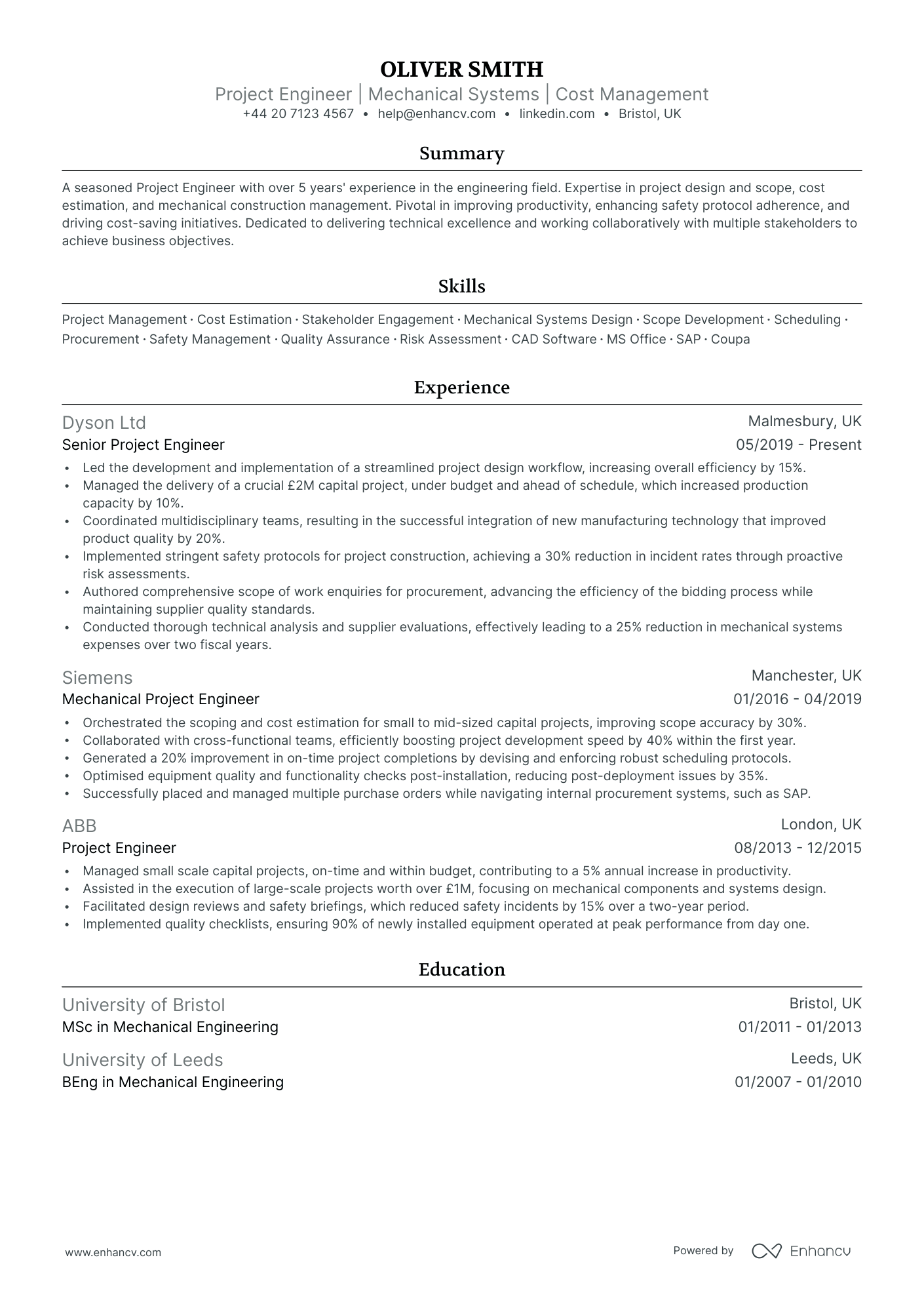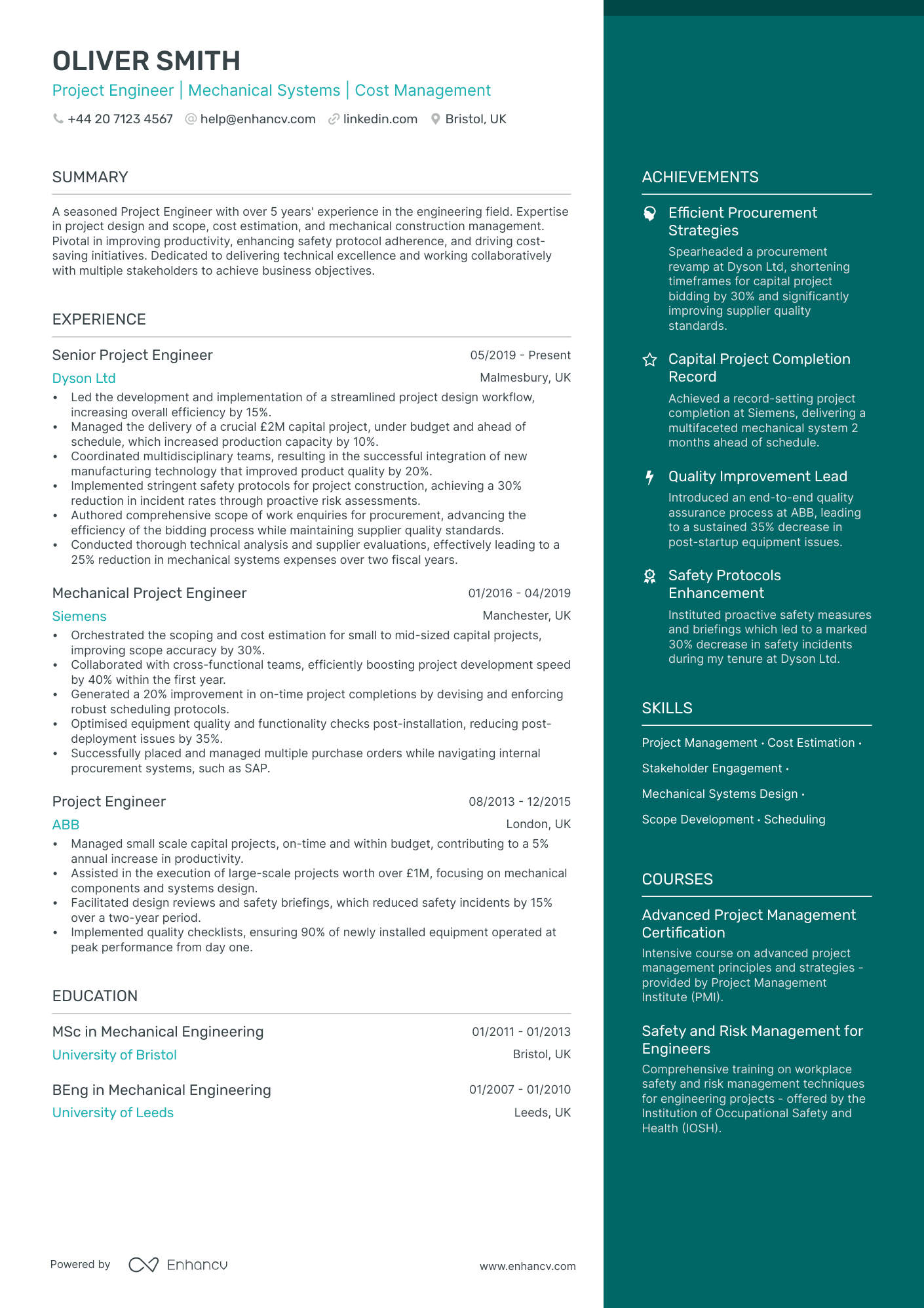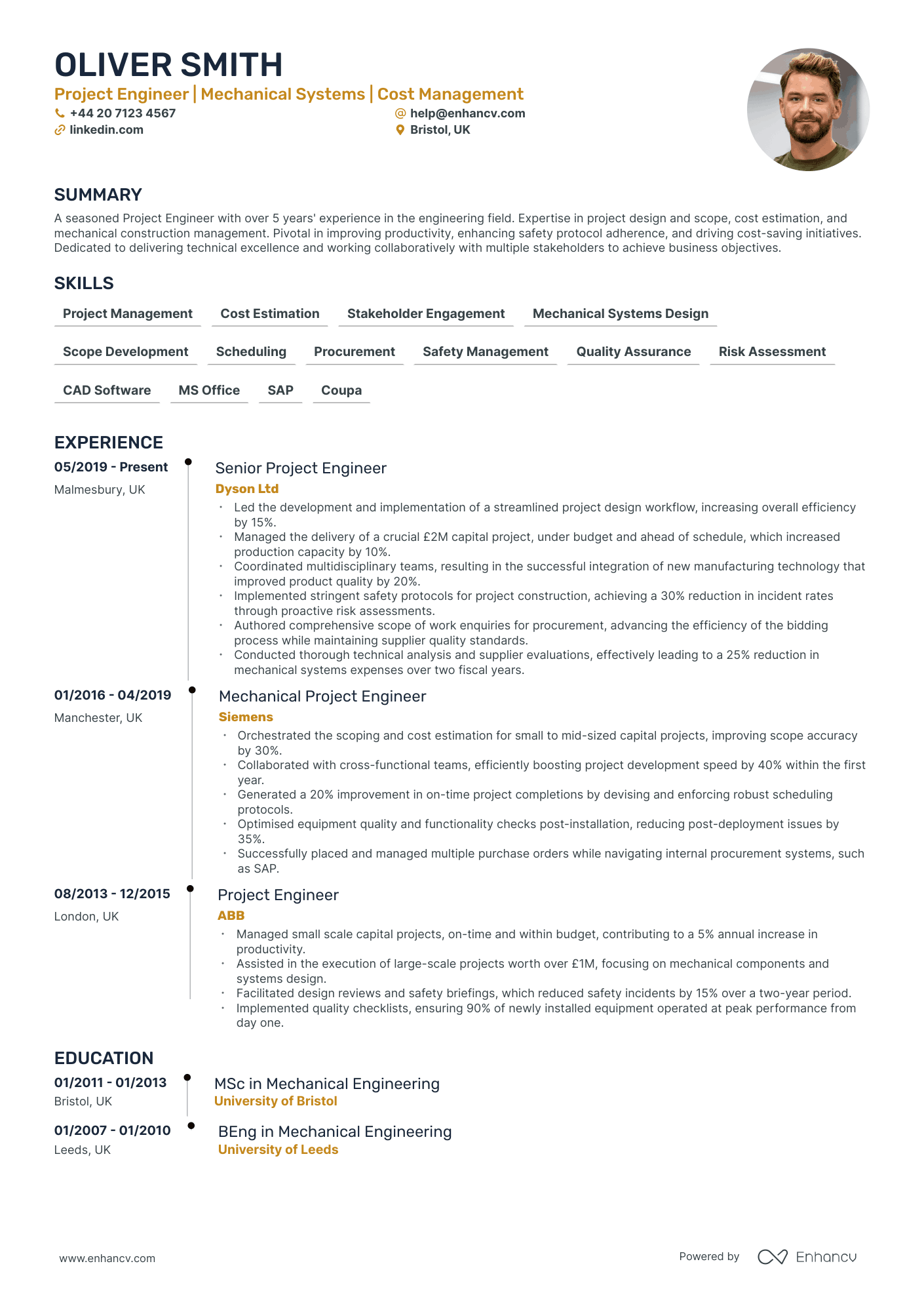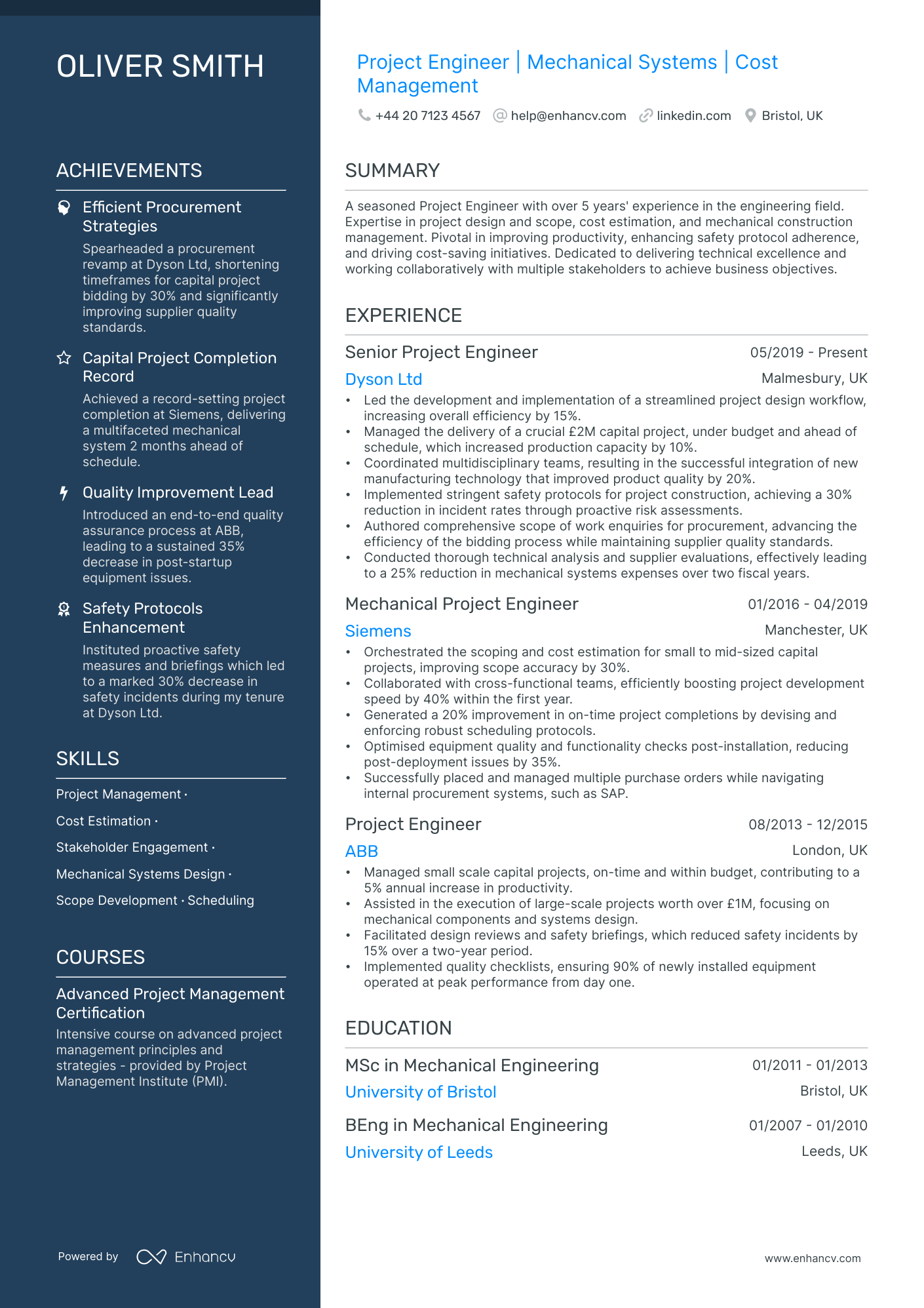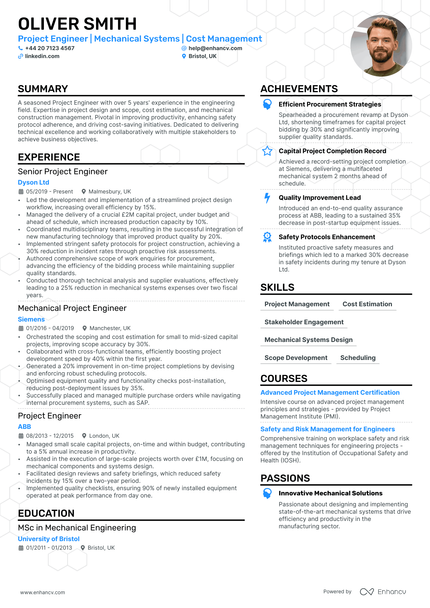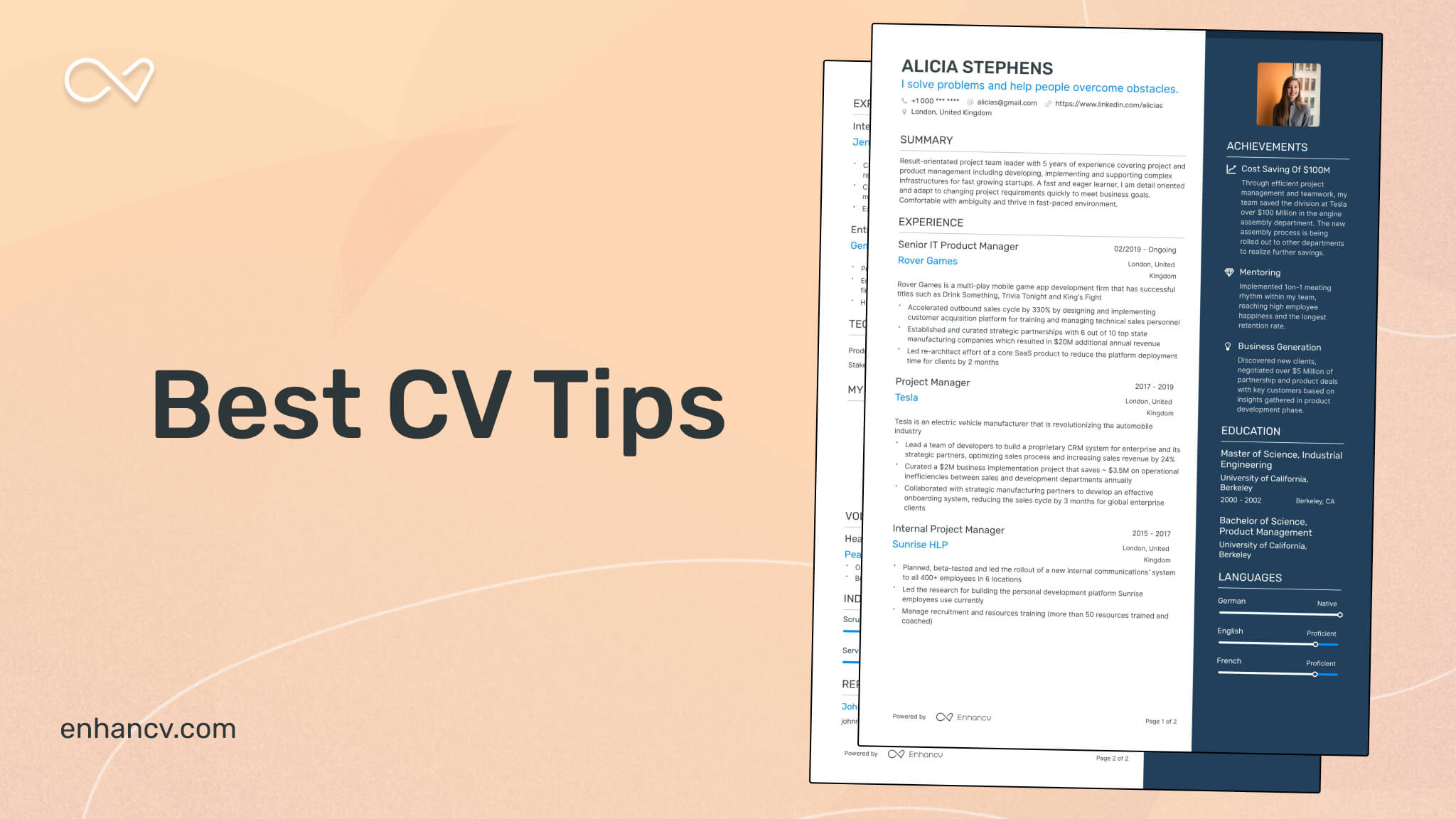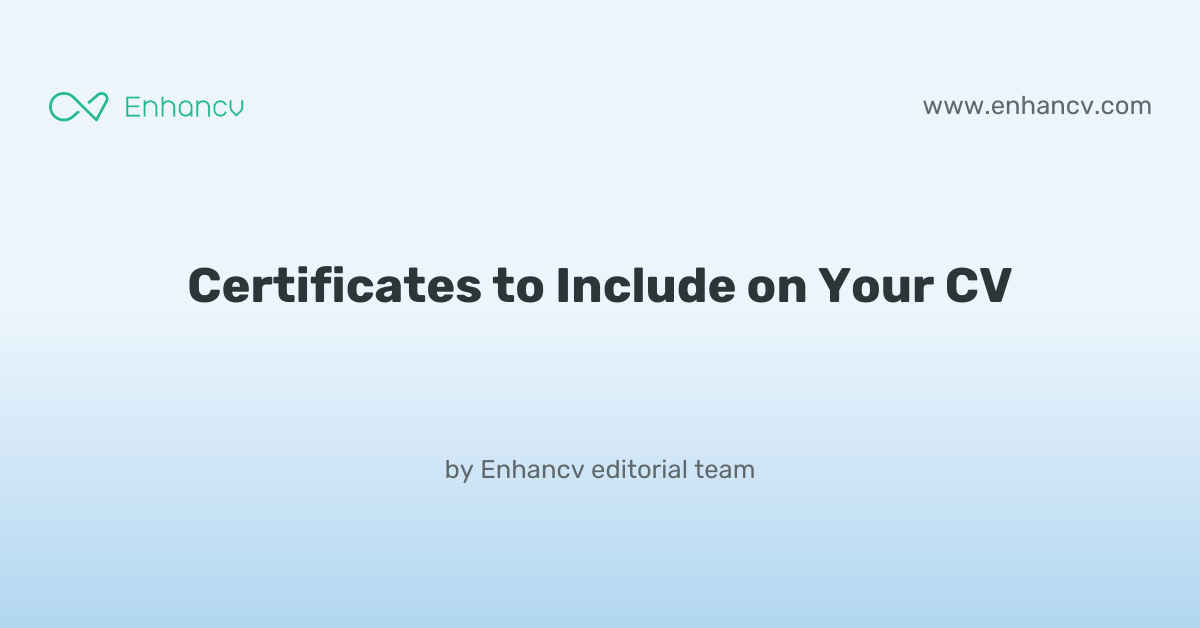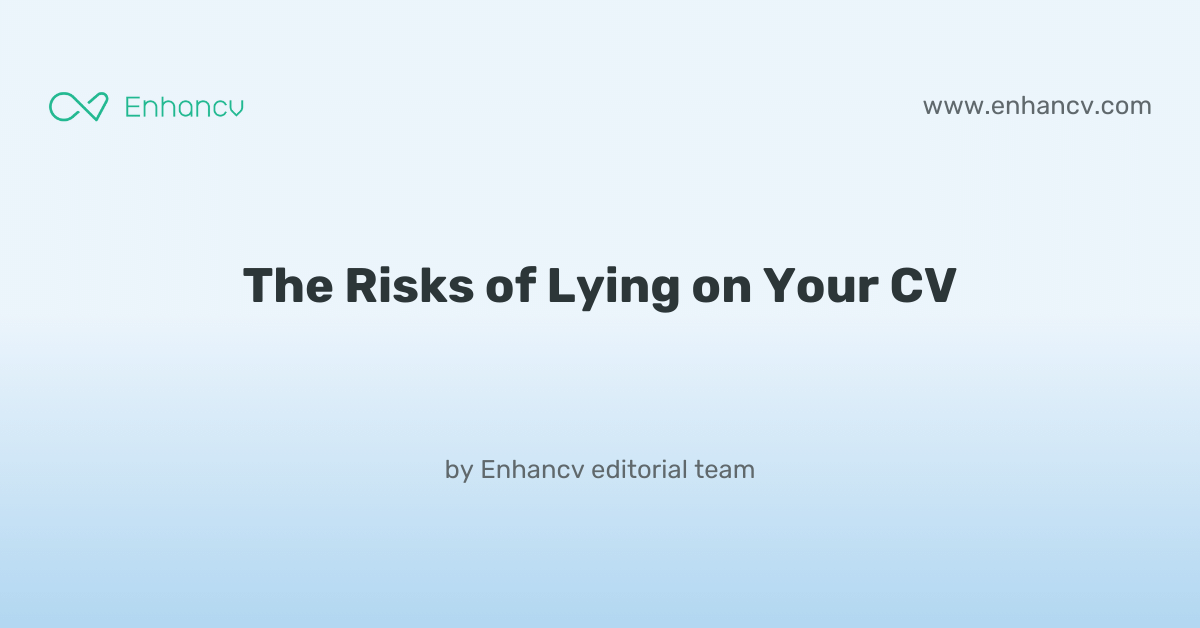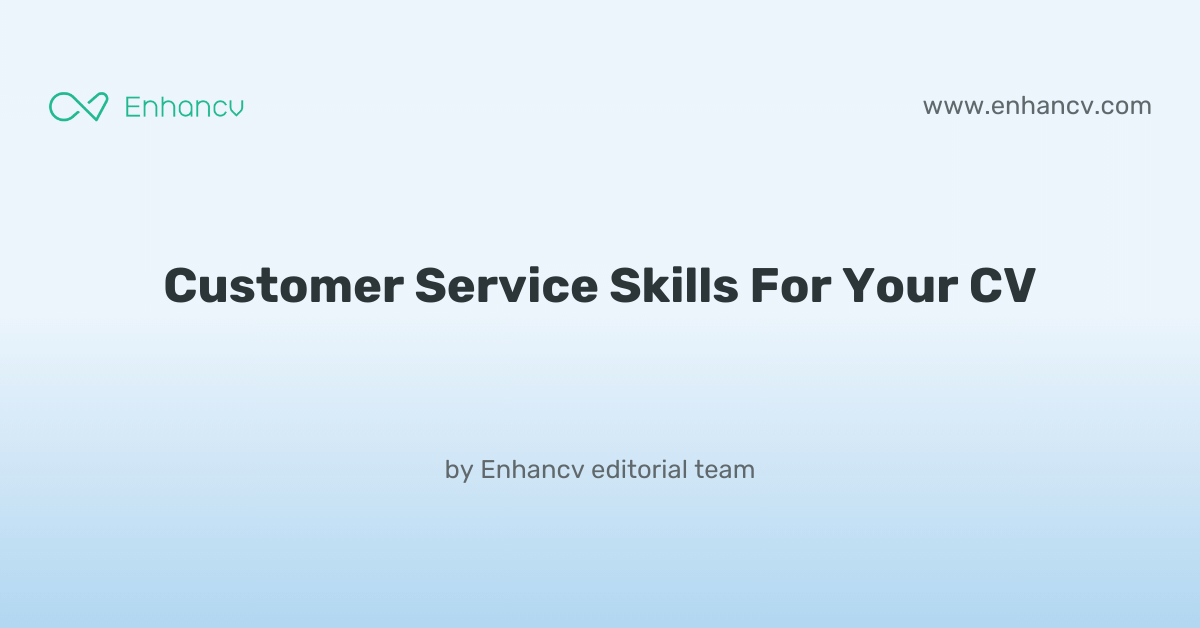Highlighting the multitude of complex projects you've managed as a project engineer can be a daunting task on your CV. Our guide provides detailed strategies for concisely encapsulating your project successes and leadership skills, ensuring your expertise shines through to potential employers.
- Design and format your professional project engineer CV;
- Curate your key contact information, skills, and achievements throughout your CV sections;
- Ensure your profile stays competitive by studying other industry-leading project engineer CVs;
- Create a great CV even if you happen to have less professional experience, or switching fields.
When writing your project engineer CV, you may need plenty of insights from hiring managers. We have prepared industry-leading advice in the form of our relevant CV guides.
Structuring and formatting your project engineer CV for an excellent first impression
The experts' best advice regarding your CV format is to keep it simple and concise. Recruiters assessing your CV are foremost looking out for candidates who match their ideal job profile. Your white space, borders, and margins. You may still be wondering which format you need to export your CV in. We recommend using the PDF one, as, upon being uploaded, it never alters your information or CV design. Before we move on to the actual content of your project engineer CV, we'd like to remind you about the Applicant Tracker System (or the ATS). The ATS is a software that is sometimes used to initially assess your profile. Here's what you need to keep in mind about the ATS:- All serif and sans-serif fonts (e.g. Rubik, Volkhov, Exo 2 etc.) are ATS-friendly;
- Many candidates invest in Arial and Times New Roman, so avoid these fonts if you want your application to stand out;
- Both single and double column CVs can be read by the ATS, so it's entirely up to you to select your CV design.
PRO TIP
Use font size and style strategically to create a visual hierarchy, drawing the reader's eye to the most important information first (like your name and most recent job title).
The top sections on a project engineer CV
- Career Summary showcases years of experience and specialisations.
- Project Management Skills highlight competencies in leading projects.
- Professional Experience details roles and responsibilities in projects.
- Key Achievements provide evidence of project successes and impact.
- Educational Background shows formal qualifications related to engineering.
What recruiters value on your CV:
- Highlight your engineering expertise, focusing on any specific areas of engineering you’ve worked in, such as civil, mechanical, or electrical, and include notable projects that demonstrate your technical proficiency and innovation skills.
- Emphasise your project management capabilities, detailing your experience in planning, execution, and completion of engineering projects, and the methodologies you’ve utilised, such as Agile or Waterfall.
- Include any experience with interdisciplinary collaboration, showcasing your ability to work with diverse teams, including architects, contractors, and other engineers to deliver complex projects successfully.
- Detail your proficiency with industry-specific software and tools, such as AutoCAD, BIM (Building Information Modelling), and project management applications like MS Project or Primavera P6.
- Outline your soft skills such as leadership, communication, and problem-solving abilities, providing examples of how you've used these skills to overcome obstacles and lead projects to completion on time and within budget.
Recommended reads:
Our checklist for the must-have information in your project engineer CV header
Right at the very top of your project engineer CV is where you'd find the header section or the space for your contact details, headline, and professional photo. Wondering how to present your the name of the city you live in and the country abbreviation as your address;
- are tailored to the role you're applying for by integrating key job skills and requirements;
- showcase what your unique value is, most often in the form of your most noteworthy accomplishment;
- select your relevant qualifications, skills, or current role to pass the Applicant Tracker System (ATS) assessment. Still not sure how to write your CV headline? Our examples below showcase best practices on creating effective headlines:
Examples of good CV headlines for project engineer:
- Project Engineer | BIM Implementation Specialist | PRINCE2® Certified | 5+ Years in Civil Infrastructure Projects
- Senior Project Engineer | Renewable Energy Systems | Chartered Status | MSc Engineering | 10 Years’ Experience
- Mechanical Project Engineer | HVAC Design Expert | Lean Six Sigma | 7 Years in Building Services
- Junior Project Engineer | Graduate with Distinction | Focus on Sustainable Construction | NEBOSH Health & Safety
- Electrical Project Engineer | High-Voltage Substation Projects | MEng Qualified | 3+ Years' Industry Insight
- Lead Project Engineer | PMP® Credential | Infrastructure Renewal | Over 15 Years of Comprehensive Expertise
Choosing your opening statement: a project engineer CV summary or objective
At the top one third of your CV, you have the chance to make a more personable impression on recruiters by selecting between:
- Summary - or those three to five sentences that you use to show your greatest achievements. Use the CV summary if you happen to have plenty of relevant experience and wish to highlight your greatest successes;
- Objective - provides you with up to five sentences to state your professional aims and mission in the company you're applying for
CV summaries for a project engineer job:
- A seasoned Project Engineer with over eight years of experience in spearheading infrastructure development projects. Highly adept in construction management, structural analysis, and budget oversight. Lauded for leading the successful completion of a $30 million bridge restoration project ahead of schedule and under budget.
- Dynamic aerospace engineer transitioning into project engineering, bringing a wealth of experience in systems integration and testing from a decade-long tenure at a leading aircraft manufacturer. Recognised for the innovative redesign of fuel systems that increased efficiency by 15%.
- An accomplished software developer with six years of progressive experience in agile project management and system architecture, pivoting towards a project engineering career. Instrumental in delivering a cloud migration strategy that resulted in a 50% cost reduction for a top-tier tech firm.
- Strategic thinker and civil engineer with five years of project coordination and sustainability planning expertise, seeking to leverage cross-industry insights against the complexities of large-scale construction projects. Skilled in environmental impact reduction and stakeholder engagement, while driving projects to timely completion.
- Eager to embark on a career as a project engineer, with a robust educational background in mechanical engineering and a keen interest in renewable energy solutions. Committed to utilising strong analytical skills and knowledge to contribute to complex engineering projects.
- Aspiring Project Engineer poised to apply a fresh perspective and extensive internship experience in industrial automation to the challenges of contemporary engineering projects. Determined to employ a deep understanding of systems engineering and project lifecycle management, honed during academic tenure and hands-on workshops.
Narrating the details of your project engineer CV experience section
Perhaps you've heard it time and time again, but, how you present your experience is what matters the most. Your CV experience section - that details your work history alongside your accomplishments - is the space to spotlight your unqiue expertise and talents. So, avoid solely listing your responsibilities, but instead:
- adverts' keywords and integrate those in your experience section;
- Use your CV to detail how you've been promoted in the past by including experience in the reverse chronological order.
Before you start writing your project engineer CV experience section, dive into some industry-leading examples on how to structure your bullets.
Best practices for your CV's work experience section
- Analyse and interpret project specifications, constructing a detailed list of engineering requirements and objectives to align with stakeholder expectations and regulatory standards.
- Coordinate multidisciplinary teams throughout the project lifecycle, ensuring effective collaboration between engineers, architects, contractors, and clients to achieve project milestones.
- Implement robust project management methodologies, such as PRINCE2 or Agile, to plan, execute, and close projects efficiently and within budget constraints.
- Execute detailed risk assessments for each project phase, proposing mitigation strategies to manage and minimise potential engineering project risks.
- Utilise advanced CAD software to design, revise, and optimise engineering solutions, thus contributing to project innovation and problem-solving.
- Prepare and maintain comprehensive project documentation, including reports, blueprints, and change orders, ensuring accuracy and accessibility for all stakeholders.
- Monitor project progress regularly, using performance metrics to track quality, timeline adherence, and budget compliance, adjusting project plans as necessary.
- Facilitate clear communication channels with clients, providing regular updates and promptly addressing concerns to maintain client satisfaction and uphold professional integrity.
- Evaluate the environmental impact of engineering activities, continually advocating for sustainable practices and the incorporation of green technology into project designs.
- Led the design and implementation of a new waste-water treatment facility, reducing processing time by 30% and increasing efficiency.
- Managed cross-functional teams of 20+ members to coordinate project deliverables within budget, culminating in a project completion 2 months ahead of schedule.
- Spearheaded the transition to renewable energy sources for on-site operations, cutting energy costs by 25% annually.
- Directed the development of a new transportation infrastructure project, enhancing supply chain logistics and resulting in a 15% increase in distribution speed.
- Instituted a rigorous quality assurance protocol that improved product reliability by 35% and customer satisfaction by 20%.
- Negotiated with vendors to secure high-quality materials at 10% below market rates, significantly lowering project costs.
- Conducted extensive R&D leading to the development of a patented construction material that reduced building costs by 18%.
- Implemented a company-wide risk management strategy, decreasing downtime due to unforeseen events by 40%.
- Championed a sustainability initiative that improved materials recycling, reducing waste by 22% annually.
- Orchestrated the integration of advanced IoT technologies into existing manufacturing systems, improving productivity by 33%.
- Developed a modular training program for new engineers, enhancing team capability and reducing onboarding time by half.
- Cultivated partnerships with leading tech firms, acquiring cutting-edge software that streamlined project management processes.
- Played a pivotal role in the design and execution of a LEED-certified commercial complex that achieved 20% lower energy consumption than similar buildings.
- Optimized supply chain operations for major construction projects, delivering a 10% reduction in material costs through strategic sourcing.
- Piloted a digital transformation project that introduced collaborative software, streamlining communication and improving project timelines by 15%.
- Launched a novel bridge construction technique that accelerated completion by 20% and reduced labour expenses.
- Organized and led a series of workshops that equipped team members with advanced analytical skills, boosting project efficiency by 28%.
- Executed contract negotiations with subcontractors, ensuring compliance with legal standards and fortifying project integrity.
- Headed a high-profile urban redevelopment project which reinvigorated a historic district, increasing local business revenue by 40%.
- Employed Lean Six Sigma methodologies to overhaul project operations, resulting in a continuous performance improvement of 25% over two years.
- Pioneered the use of drone technology for site surveys, enhancing topographic accuracy and reducing survey time by 50%.
- Initiated and managed the transition to Building Information Modelling (BIM) for project designs, improving collaboration and reducing rework by 20%.
- Successfully delivered a complex £20 million upgrade to water treatment systems, meeting stringent environmental and safety standards.
- Optimized vendor management processes, building robust supply chains that improved material delivery times by 30%.
What to add in your project engineer CV experience section with no professional experience
If you don't have the standard nine-to-five professional experience, yet are still keen on applying for the job, here's what you can do:
- List any internships, part-time roles, volunteer experience, or basically any work you've done that meets the job requirements and is in the same industry;
- Showcase any project you've done in your free time (even if you completed them with family and friends) that will hint at your experience and skill set;
- Replace the standard, CV experience section with a strengths or achievements one. This will help you spotlight your transferrable skills that apply to the role.
Recommended reads:
PRO TIP
Describe how each job helped you grow or learn something new, showing a continuous development path in your career.
Describing your unique skill set using both hard skills and soft skills
Your project engineer CV provides you with the perfect opportunity to spotlight your talents, and at the same time - to pass any form of assessment. Focusing on your skill set across different CV sections is the way to go, as this would provide you with an opportunity to quantify your achievements and successes. There's one common, very simple mistake, which candidates tend to make at this stage. Short on time, they tend to hurry and mess up the spelling of some of the key technologies, skills, and keywords. Copy and paste the particular skill directly from the job requirement to your CV to pass the Applicant Tracker System (ATS) assessment. Now, your CV skills are divided into:
- Technical or hard skills, describing your comfort level with technologies (software and hardware). List your aptitude by curating your certifications, on the work success in the experience section, and technical projects. Use the dedicated skills section to provide recruiters with up to twelve technologies, that match the job requirements, and you're capable of using.
- People or soft skills provide you with an excellent background to communicate, work within a team, solve problems. Don't just copy-paste that you're a "leader" or excel at "analysis". Instead, provide tangible metrics that define your success inusing the particular skill within the strengths, achievements, summary/ objective sections.
Top skills for your project engineer CV:
Engineering design
Project management
CAD software proficiency
Budgeting and cost control
Quality assurance standards
Risk management
Contract negotiation
Knowledge of industry regulations
Materials science
Scheduling and planning software
Leadership
Communication
Problem-solving
Teamwork
Time management
Attention to detail
Adaptability
Conflict resolution
Critical thinking
Decision-making
PRO TIP
Focus on describing skills in the context of the outcomes they’ve helped you achieve, linking them directly to tangible results or successes in your career.
Education and more professional qualifications to include in your project engineer CV
If you want to showcase to recruiters that you're further qualified for the role, ensure you've included your relevant university diplomas. Within your education section:
- Describe your degree with your university name(-s) and start-graduation dates;
- List any awards you've received, if you deem they would be impressive or are relevant to the industry;
- Include your projects and publications, if you need to further showcase how you've used your technical know-how;
- Avoid listing your A-level marks, as your potential employers care to learn more about your university background.
Apart from your higher education, ensure that you've curated your relevant certificates or courses by listing the:
- name of the certificate or course;
- name of the institution within which you received your training;
- the date(-s) when you obtained your accreditation.
In the next section, discover some of the most relevant certificates for your project engineer CV:
PRO TIP
If you have received professional endorsements or recommendations for certain skills, especially on platforms like LinkedIn, mention these to add credibility.
Recommended reads:
Key takeaways
Your successful job application depends on how you well you have aligned your project engineer CV to the job description and portrayed your best skills and traits. Make sure to:
- Select your CV format, so that it ensures your experience is easy to read and understand;
- Include your professional contact details and a link to your portfolio, so that recruiters can easily get in touch with you and preview your work;
- Write a CV summary if you happen to have more relevant professional experience. Meanwhile, use the objective to showcase your career dreams and ambitions;
- In your CV experience section bullets, back up your individual skills and responsibilities with tangible achievements;
- Have a healthy balance between hard and soft skills to answer the job requirements and hint at your unique professional value.
